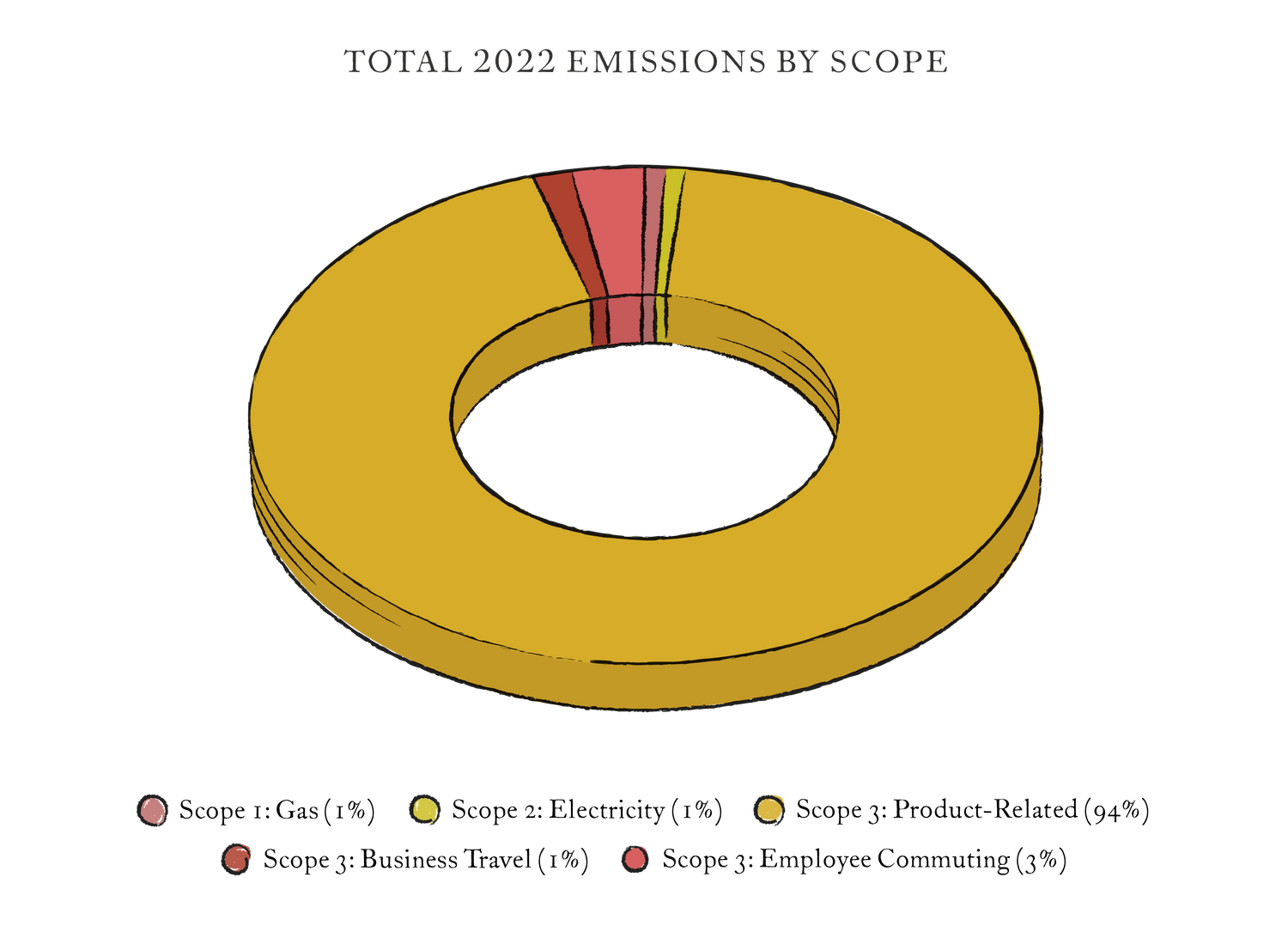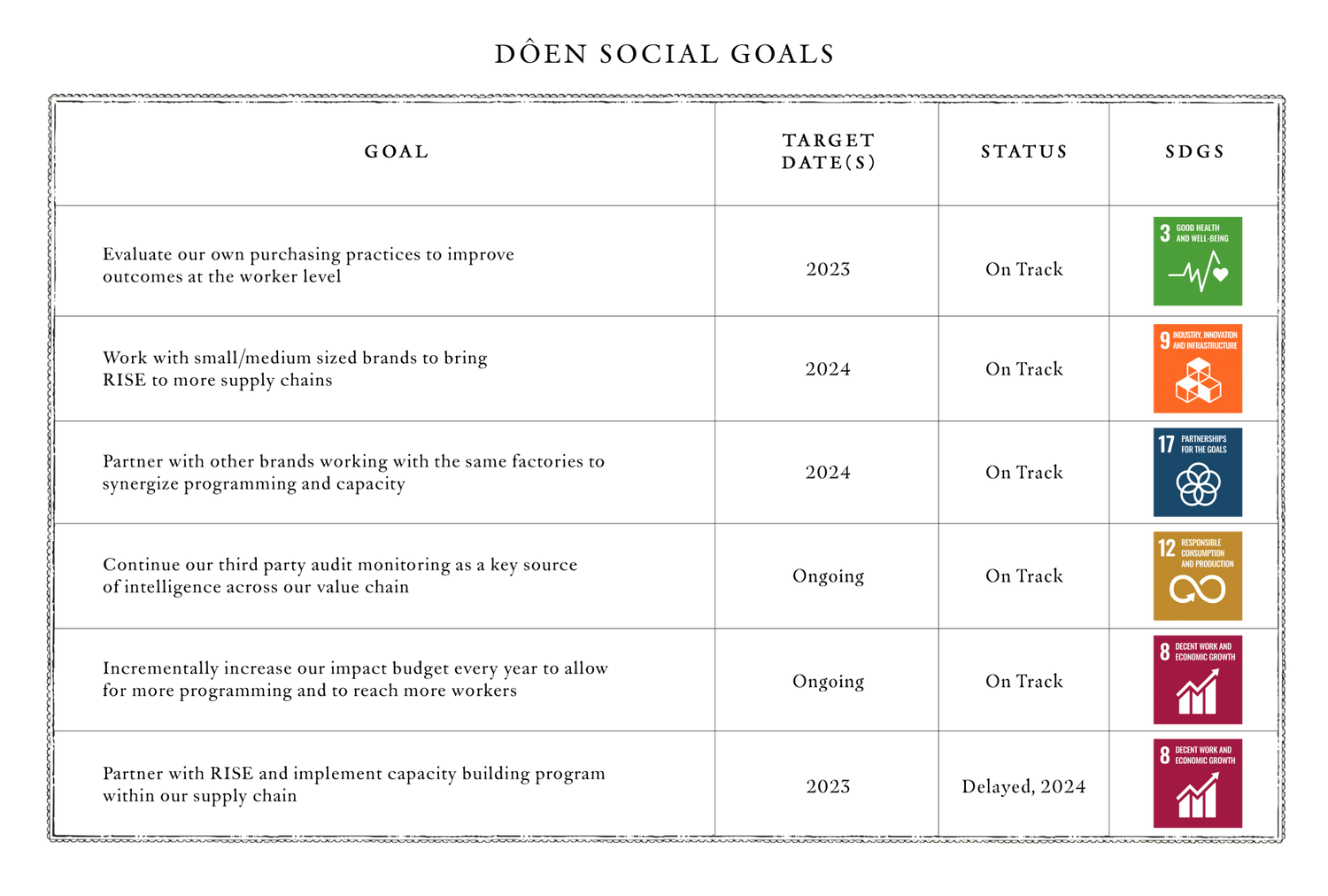2023 Impact Update
01. Introduction
Our mission at DOEN is to create lasting, beautiful collections while supporting women-identifying individuals in all aspects of our organization, value chain, and community. Within that mission, our 2030 Roadmap published in January of this year lays out our approach to business: to view our supply chain as a value chain, and to commit to creating more environmental and social value across every tier and function of that model – and we encourage you to read it in full here.
We committed to updating our community annually about our progress – and our challenges – in meeting our 2030 goals. We have spent this year building upon the pillars of our roadmap, listening closely to our partners across our supply chain, and putting our words into action. Our Impact team grew to two full time employees and we spent much of the year focused on internal learning and alignment. We hosted several “impact lunch and learns” to bring together the entire company to better understand the fashion and textile systems and their impacts.
We also developed and integrated several impact initiatives – such as our Preferred Material Strategy and Purchasing Practices Strategy – across our internal teams and our value chain. We’re so excited to share more details about those strategies soon, but our goal for this report is to update our community on our 2022 , our progress toward our carbon reduction goals, and share a high-level progress update on our other environmental and social impact work. We plan to publish a robust Impact Report in the first half of 2024, to align with the industry calendar for ESG reporting.

02. Environmental
Carbon Update
Carbon reduction is foundational to our overall environmental strategy. Last year, we mapped and measured our greenhouse gas emissions for the first time. It was an eye opening experience and resulted in us developing a robust and custom carbon reduction strategy as a pillar of our 2030 roadmap. We also aligned our carbon reduction goals to the Science Based Target Initiative (SBTi) – which sets emissions reduction targets in line with climate science to limit global warming to 1.5°C above pre-industrial levels. Our goal is a 38% absolute reduction by 2030 across and , and we are working toward a year-over-year energy intensity reduction for .
This was our second year mapping and measuring our greenhouse gas emissions across our value chain. The pie chart below shows the breakdown of our emissions across all 3 Scopes. The emissions we have direct control over only represent 2% of total emissions, while the bulk of our emissions are indirect emissions from the creation and distribution of our products (i.e. raw materials, textile and garment manufacturing, transportation and distribution, product care, and end-of-life).


We were encouraged that we achieved our Scope 3 goal with an 8% decrease in emission intensity per product. This was partly due to our focus on gathering more for our calculations (instead of relying on global averages), but mostly this decrease is because of our partners across our value chain who prioritized reducing their own impact, such as switching to renewable energy or moving to more energy efficient manufacturing methods. We are grateful to have wonderful partners who are as committed as we are to reducing our collective carbon footprint and are excited to see how we can work even more collaboratively toward our carbon goals.
We recognize we have more work to do, as our Scope 1 emissions increased by 41% and our Scope 2 increased by 8%. However, this increase was expected due to planned business growth and exciting new ventures – like opening our newest retail location in New York! We knew many of our initiatives to reduce our Scope 1 and Scope 2 emissions would not happen overnight. These are often complex, multi-stakeholder, and multi-year projects that we are tackling strategically – one at a time. For example, at the beginning of this year, we replaced our gas-powered van with an EV. We’re excited to see how this and other ongoing initiatives (such as the development of an Energy Management System for all our facilities) will reduce our Scope 1 and 2 emissions for 2023 – and get us closer to our 2030 SBT goals. We plan to include a more robust carbon accounting and reduction strategy in our 2024 Impact Report.

Other updates
Below are updates on our other carbon goals, including the successful launch of our resale platform, Hand Me Dôen. We’re so grateful to our community and their commitment to giving new life to their garments. While most of our goals are on track (or achieved!) we also want to recognize what goals need extra attention. For example, we were excited to conduct DÔEN-specific Life Cycle Analysis (LCA) for core fabrics, but global tensions, shifting priorities, and other factors limited our ability to do so. We still believe there is great potential value in conducting and publicly sharing LCAs and look forward to getting back on track next year.


One goal we’re particularly excited about achieving is the development of our Preferred Material Strategy. As mentioned above, we only have direct control over approximately 2% of our carbon footprint, so it is essential that we develop transparent and supportive relationships with partners across our value chain to facilitate and encourage further carbon reductions. One of the most impactful ways we can do that is through sourcing preferred materials with lower impacts than their traditional counterparts. We’re proud of our long standing commitment to sourcing lower impact materials like organic cotton and recycled fibers – but we knew we could do more. The materials we choose can make up to 2/3rds of a garment’s overall carbon footprint1 – not to mention their impacts on human welfare, biodiversity, soil health, and water systems. These are complex value chains with environmental and social considerations at every level: from the type of farming used to grow the fibers to how the fibers are processed and spun through to the chemicals and dyes applied in the final fabrics.
As such, we developed a Preferred Material Strategy that is based on leading science and partnerships with preeminent textile and apparel organizations, yet custom to DOEN and our unique value chain. It is important to set aspirational goals for where we want to get to, while also understanding the current challenges and opportunities unique to a small brand like ours. For example, we may have limited access to some preferred materials, but we are also more nimble than other brands and able to make quicker sourcing decisions and changes. We look forward to sharing our tailored approach to preferred materials in our next report, as well as our progress to date, but for now, we are focused on stress testing the strategy, supporting our partners in sourcing preferred fibers, and improving the traceability of our value chain down to the farm level. Stay tuned!

03. Social
RISE: Reimagining Industry to Support Equality
At the beginning of the year, we joined RISE as the first small brand partner committed to the program’s mission of empowering women workers, embedding gender equality in business practice, and catalyzing systems change in global supply chains. Our intention is to function as the test case for brands of similar size and scale to join this important, resource intensive work, and to bring more value to our garment workers as their brand partners. While we have joined the RISE program this year, our hope was to implement the pilot program with our key vendor in India in 2023 as well. Given the complexities of a small business and supply chain, we have updated the implementation goal to be 2024.


Homeboy Threads
We have two exciting new updates to share with our community that were not initially envisioned with our 2030 roadmap goals. First, we have partnered with Homeboy Threads, an incredible social enterprise supporting formerly incarcerated individuals re-entering the workforce, to recycle our local textile waste. A part of Homeboy Industries, Homeboy Threads relies on hand sorters to downcycle textile waste that would otherwise be discarded. While Homeboy Industries has many social enterprises, Homeboy Threads is particularly special because the sorting can be done while seated, which may be better suited for individuals who are unable to participate in more physically intensive work.
Global Reporting Institute
Second, we have joined the Global Reporting Institute (GRI) working group for the textile and apparel sector. Our industry lacks standardization as it relates to sustainability information, practices, and reporting. As such, GRI is convening a working group for the textile and apparel sector to establish the industry's first set of standard reporting metrics. DÔEN will be one of 21 global stakeholders contributing to the formation of global sector standards for sustainability reporting. We are extremely excited about both of these new initiatives and look forward to sharing more with our community as they develop.

04. Conclusion
It’s been an incredibly educational and productive year-to-date for our impact work. We look forward to sharing even more details and updates in our next report, but, until then, we want to thank our DOEN community for their support and trust in us. We recognize that we are not perfect and these are complicated, challenging discussions, but we are steadfast in our pledge to march towards progress and continuous improvement. Thank you!